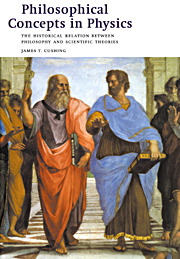 Philosophical Concepts in Physics
Philosophical Concepts in Physics Published online by Cambridge University Press: 05 June 2012
Both empirical considerations and mechanical models of the aether provided the foundation upon which Maxwell built his classical theory of electromagnetism. In this chapter we first discuss some formal aspects of this theory and then turn to observational consequences of it that led to a profound conflict between the principles of classical mechanics and those of electromagnetic theory. This will set the stage for our treatment of relativity in later chapters.
MAXWELL'S EQUATIONS
Prior to Maxwell's great synthesis, the basic laws of the separate fields of electricity and of magnetism were, respectively, Coulomb's law for the electric field E produced by a static point charge q and the Biot–Savart law for the magnetic field B produced by a wire carrying a current i. (See Section 14.A for mathematical statements of these laws and for the mathematical details that support many of the claims made in the present section.) Each of these two laws involves a proportionality constant (say, k1 and k2, respectively) that must be determined by experiment. (These are analogous to the constant G in Newton's law of gravitation, Eq. (8.4).) That is, the constants k1 and k2 are fixed independently and by different types of phenomena (electrostatics and magnetostatics, respectively). It turns out that the ratio k1/k2 has the dimensions of a velocity squared that we denote by c2 for reasons that will become evident shortly.
To save this book to your Kindle, first ensure [email protected] is added to your Approved Personal Document E-mail List under your Personal Document Settings on the Manage Your Content and Devices page of your Amazon account. Then enter the ‘name’ part of your Kindle email address below. Find out more about saving to your Kindle.
Note you can select to save to either the @free.kindle.com or @kindle.com variations. ‘@free.kindle.com’ emails are free but can only be saved to your device when it is connected to wi-fi. ‘@kindle.com’ emails can be delivered even when you are not connected to wi-fi, but note that service fees apply.
Find out more about the Kindle Personal Document Service.
To save content items to your account, please confirm that you agree to abide by our usage policies. If this is the first time you use this feature, you will be asked to authorise Cambridge Core to connect with your account. Find out more about saving content to Dropbox.
To save content items to your account, please confirm that you agree to abide by our usage policies. If this is the first time you use this feature, you will be asked to authorise Cambridge Core to connect with your account. Find out more about saving content to Google Drive.